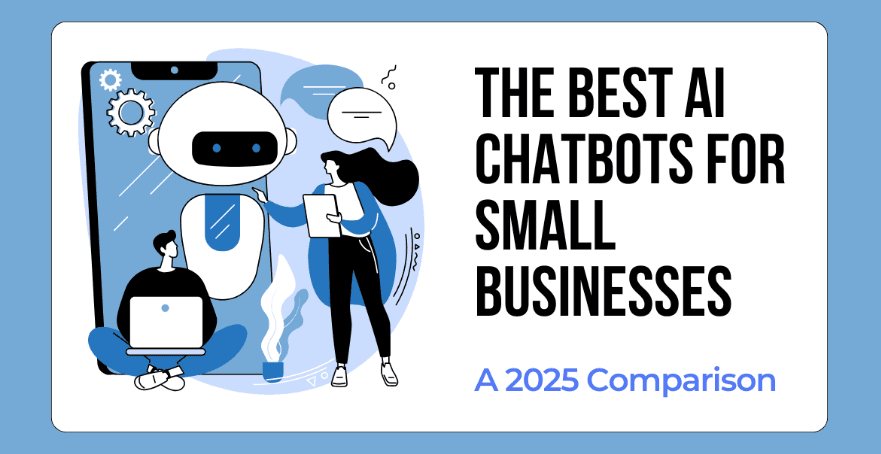The Best AI Chatbots: A 2025 Comparison
Feb 11, 2025
Artificial Intelligence (AI) chatbots are transforming industries, providing smarter, faster, and more personalized solutions for businesses worldwide. As we step into 2025, the AI chatbot market is brimming with innovative tools, each offering unique features to meet varying business needs. This guide takes a deep dive into the top AI chatbots of 2025, comparing their strengths, weaknesses, and ideal use cases to help you choose the right solution. Additionally, we’ll explore emerging trends, common challenges, and practical strategies for integrating AI chatbots effectively into your business.
Why Are AI Chatbots Crucial in 2025?
AI chatbots have evolved from basic automated response systems into powerful tools capable of natural conversations, contextual understanding, and advanced integrations. In an increasingly digital world, these chatbots enable businesses to:
Provide 24/7 customer support
Automate repetitive tasks
Drive sales conversions with proactive engagement
Scale operations without increasing costs
Collect valuable customer data for strategic decision-making
Integrate seamlessly with CRM tools and other software systems
Trends Shaping AI Chatbots in 2025
Hyper-Personalization: AI chatbots now use sophisticated machine learning algorithms to deliver personalized interactions based on user behavior.
Voice-Activated AI: Voice-based chatbots are gaining traction, particularly in sectors like retail and healthcare.
Omnichannel Integration: Businesses are deploying chatbots across multiple platforms, ensuring seamless user experiences.
Focus on Security: Enhanced privacy features and compliance with global data protection regulations are now critical in AI chatbot solutions.
AI-Powered Analytics: Chatbots are increasingly being used to analyze customer sentiment and behavior, enabling data-driven decisions.
The Top AI Chatbots of 2025
Here are the top AI chatbots revolutionizing the market in 2025, analyzed across key criteria such as features, pricing, and ideal use cases.
1. AI Chatbot Hub
AI Chatbot Hub delivers tailored AI solutions for businesses, focusing on seamless integrations, advanced analytics, and scalable tools.
Key Features:
Contextual AI for dynamic, personalized responses
Real-time analytics dashboard
Integration with websites, apps, and CRMs
Multilingual support for global audiences
Advanced customer segmentation for targeted interactions
Ideal For:
Mid to large-scale businesses
Companies with diverse customer engagement needs
Organizations prioritizing data-driven strategies
Pros:
✅ Advanced customization options
✅ Strong focus on analytics and reporting
✅ Scalable solutions to support business growth
✅ Seamless integration with omnichannel platforms
✅ Easy to use with excellent support
Cons:
❌ Some users may require minimal onboarding to fully utilize all advanced features, but AI Chatbot Hub provides excellent support to ensure a smooth setup
2. Landbot
Landbot specializes in no-code chatbot solutions, enabling businesses to create interactive conversational flows with ease.
Key Features:
Drag-and-drop interface for fast customization
Pre-built templates for quick deployment
Multichannel support, including WhatsApp and Facebook Messenger
Real-time performance tracking
Ideal For:
Small to medium-sized businesses
Marketing campaigns and lead generation
Companies with limited technical resources
Pros:
✅ Extremely user-friendly interface
✅ Affordable for startups and small businesses
✅ Flexible enough for various industries
Cons:
❌ Limited advanced AI capabilities
❌ Not suitable for highly complex use cases
3. Intercom
Intercom combines chatbots with live chat to create a hybrid support experience, transitioning seamlessly between human and automated assistance.
Key Features:
Proactive messaging to engage users
CRM integration for deeper personalization
Advanced workflow automation
In-depth team performance metrics
Ideal For:
Enterprises seeking advanced automation
Customer support-focused organizations
Companies needing a hybrid approach
Pros:
✅ Exceptional integration capabilities
✅ Allows for human-bot collaboration
✅ Detailed analytics for optimizing workflows
Cons:
❌ Higher cost for premium features
❌ Requires moderate technical expertise to fully utilize
4. ChatGPT (OpenAI)
ChatGPT, powered by OpenAI, continues to set the benchmark for conversational AI with its unparalleled language understanding and adaptability.
Key Features:
Highly customizable conversational flows
Advanced Natural Language Processing (NLP)
API integrations for seamless workflow connectivity
Ongoing updates for enhanced performance
Ideal For:
Large enterprises with complex customer interaction needs
Organizations seeking natural and human-like conversations
Pros:
✅ Exceptional NLP and language comprehension
✅ Supports complex use cases across industries
✅ Reliable updates and improvements
Cons:
❌ High cost for extensive usage
❌ Demands technical expertise for optimization
5. Tidio
Tidio is an accessible AI chatbot solution designed specifically for small businesses and e-commerce platforms.
Key Features:
E-commerce templates for quick deployment
Multichannel communication, including email and live chat
Plug-and-play setup requiring minimal technical knowledge
User-friendly dashboard for performance tracking
Ideal For:
E-commerce businesses
Startups looking to scale their support operations
Companies seeking affordable chatbot solutions
Pros:
✅ Market leader
✅ Beginner friendly pricing structure
✅ Seamless Shopify integration
Cons:
❌ Limited scalability for larger businesses
❌ Basic conversational capabilities
❌ Complex workflow building systems
Addressing Challenges in AI Chatbot Implementation
1. Integration with Existing Systems
Businesses often struggle to align chatbots with their existing tools. Solutions like AI Chatbot Hub simplify this process by offering robust APIs and seamless integrations.
2. Balancing Automation and Human Interaction
While automation drives efficiency, businesses must integrate human agents for complex queries. Hybrid models like Intercom excel in striking this balance.
3. Maintaining Data Privacy
With stricter global data regulations, choosing a chatbot provider that prioritizes security, like ChatGPT or AI Chatbot Hub, is essential for compliance.
Conclusion
The AI chatbot landscape in 2025 offers diverse options tailored to businesses of all sizes and industries. From entry-level solutions like Tidio to advanced systems like ChatGPT and AI Chatbot Hub, there’s a chatbot to meet every need. As you evaluate your options, consider your specific goals, budget, and the level of technical expertise available within your team.
For expert guidance and customized solutions, visit AI Chatbot Hub and explore how intelligent automation can elevate your customer interactions and streamline your operations.
Related articles

Customer Service
General
The Best AI Chatbots: A 2025 Comparison
Feb 11, 2025

General
What Is Prompt Engineering?
Oct 29, 2024

Customer Service
Top 3 Prompts for Customer Support AI Agents
Sep 8, 2024